#ancient egyptian magic
Note
Oh? How normal are we about Pharaoh Cub?
Okay look. You gotta understand. I've been interested in ancient Egpyt since I was a kid. It's my longest-running special interest/hyperfixation, so much so that I've been practicing ancient Egyptian religion for over twenty years. It's something that's very, very precious to me, bc it's so personal to me, and bc I'm who I am, my knowledge of this stuff is arguably higher than the average person. This makes any kind of media about ancient Egypt actually not that interesting to me bc my brain will Not shut up about inaccuracies, so I tend to avoid them bc of that.
(I could go on about my issues with ancient Egyptian themed media, but I won't, that's a whole 'nuther essay frfr.)
(Also I hope you like infodumping, anon, bc that's what I'm about to do :D)
That said, I've actually written a whole lot of Egyptian myth rewrites, as well as ancient Egyptian stories exploring all kinds of various topics. I have some published on an old blog of mine, but some I never finished for various reasons. It's a whole thing. It's been a whole thing for me for a very, very long time.
So, you're me, someone with a more than average knowledge of and interest in ancient Egypt, and you've just become a Cub fan in s8 bc that was my first Hermitcraft season. I had heard about the pyramid, and Pharaoh Cub, and I was both SO INTERESTED but also actually quite hesitant to watch Cub's s7, bc I didn't want to be disappointed if he messed it up or did something wrong that caused my brain to Disagree. Again, very irrational bc my brain do be like that, but also based on previous experiences of seeing ppl just taking the aesthetics and doing whatever with it, and screw historical accuracy.
(Honestly, this is, like, my One (1) critism with the lore TrixyBlox built into the USW map. Can we Not have evil pharaohs plz just for once. ;_;)
I wanted to trust Cub, bc I'd seen the research that went into the canyon build. He's a smart dude. He cares about getting those kinda details right. And I did genuinely want to see how he approached the pyramid build and how he was going to use it as a base. But again, SO HESITANT. bc what if my blorbo messes it up and ruins the whole thing for me bc m brain is Stupid about this sort of thing. ;_;
But I'm so glad I trusted Cub when I did get around to watching s7, bc I fell in love with the pyramid. The fact that he cared about making it as life-size as possible, but also that he took an approach of taking what works, but also making it his own, and making it fit into the minecraft world. Like, using Standard Galactic for hieroglyphs! I loved that small little detail! It makes so much sense to use it that way.
Like, my very-not-srs gripes about the Pharaoh skin and its weird sleeves aside, his approach was very much how a lot of Egyptian pagans approach things today. Take what works, or what makes sense, and adapt it to where we currently are in the world and what we have access to. And I could tell from how he talked about it throughout the season that he really had done his research. And just- The Morning and The Evening Sun/Star epithet he gave himself like!!!!
Like, it's the little things, like the lapis roof, the stars - including Sirius!, the most important one bc its rising heralds the flood of the Nile and the new year - on the ceiling in the bedroom, the statue room and the way he built those five statues to represent aspects of himself (I cannot stress enough how much I adored those statues), allll the little tunnels and sekrit passageways, and the cartouche on the wall with his name in SGA and using SGA in the museum room, the treasure room with its traps, and the tomb of the Pharaoh himself. Like. It was such a perfect blend of Cub and Egyptian stuff. 10/10. I can find no faults. Although I do want to go back and finish the oasis room at some point. Make it a healing pool room with a shrine or two in it. Something like that.
Like, I had my doubts, but I trusted Cub and his process, and I was right to do so. It cemented Cub as my favourite Hermit at that point, bc he took my special interest and did it justice. And that's why I'm Very Normal about Pharaoh Cub.
But there are also other aspects too! Pyramids were designed to be tombs, and that's where the Pharaoh was left to rest at the end of s7. Which seems very appropriate, given where Hermitcraft went after that.
The reason I fixate so much on this is that there's this Egyptian underworld book called the Book of Caverns, that describes the King's journey through the underworld. It's not as well-known as the Book of the Dead, but the reason I keep coming back to it is because of Cub's canyon in s8. Where he built everything in little caverns in the canyon itself. And with the change of skin to young Cub, my brain just cannot let go of the idea of s8 being Pharaoh Cub's journey through the underworld, culminating with the final battle against the serpent we do not name so we do not give it power (a/p/o/p/h/i/s) that is here manifested in s8 as Moon Big. It's not a perfect metaphor, and I won't pretend it is. Especially bc while Cub escapes, the world is destroyed, and that's not necessarily accurate. But! He still escapes! He uses all his knowledge and resources that he's gained through his journey through the underworld to escape. To rise again in s9 as the new sun.
AND AND AND the fact that in s9 PHARAOH CUB DID ACTUALLY RETURN. Only now, we have the Pharaoh as a distinct entity. A divine akh/ancestor, a master magician, one who is clever and wiley like Thoth and who loves playing games and playing pranks. (Thoth is a trickster, and a very smart one.) And to have the distinction between Pharaoh Cub, who is a god, and mortal Cub, who is just Cub, like.
(Cub and his possession kink is also a whole 'nuther essay frfr)
That distinction makes sense in an Egyptian theological framework. Once the Pharaoh dies, they become divine akhu/ancestors. Very few were Actually Deified in a way we would recognise, but Cub is still not wrong when he calls the Pharaoh a god. The Pharaoh was a conduit between the people and the gods. He acted as the only high priest of the religion. He became King by hosting the Kingly Ka, the divine soul of Horus that legitimises their rule. This Ka/soul, has been with every king before it, and all the kings are attached/accessed through it. Kings live forever, after all. My own personal religious work has involved various Kings and Queens and working with them. (Not the most famous ones, tho, it's mostly the Sobek ones bc I worship Sobek first and foremost.)(Sobek being a crocodile god, a strong protector, and a god who was incorporated in Horus at one stage and gained Kingship attributes from that.)
And so it makes so much sense for the Pharaoh to be a separate entity now. The old man died, bc Cub is mortal, and ba/eternal soul of Cub was reborn into a new, younger body, with a whole new ka. Everyone has a ka, it is the soul that belongs to a particular lifetime and is the one that goes through judgement after death. The ba is eternal, and can have many kau/souls throughout its existence.
And bc the Pharaoh has died and become an akh, he can be contacted and manifest in the world again through the mortal Cub. The fact that Cub never actually changed the Pharaoh skin to reflect his younger self? It still has the old man's face? Like. This helps the distinction work. They're two different souls. This is theologically sound. And honestly I never imagined the Pharaoh lore would get to that point. But here we are, in s9, and we have the Pharaoh and mortal Cub, and I am Just So Normal about this bc I thought I'd missed my chance at Pharaoh Cub bc I only started watching in s8. BUT NO. s9 came along and is like, would you like some more Pharaoh Cub? and it's eating my brain like. oh my gods.
And also like, the Vex Magic Grimoire I've been working on? Canonically (to me), it's being written by Pharaoh Cub. Once the ConVex and ConCorp shenanigans settled down, and Cub had space to really focus on his magic, that's when he starts working on the grimoire. bc almost all Pharaohs were also master magicians. They had to be! It was part of their work as high priest and conduit for the gods. So Cub has Pharaoh magic on top of Vex magic, and in working through his new powers, decides to start recording down all he knows about Vex magic. Scar does some as well, but it is intended to be mostly Cub.
(I have an ask I STILL have not got around to about the Pharaoh's magic, and I will save a longer discussion for that there. I will get to it, I promise, anon! It's just taken a while to get my thoughts in order. <3)
It's like, in Pharaoh Cub, I can combine my love of writing about Egyptian things with my current hyperfixation on Cub, and it's so much fun omg. Cub doesn't do deep lore the way someone like Sausage does (again, whole 'nuther essay lol), but there's enough there to make a really good story, and build up these aspects of his character and make a really coherent story out of it.
And with Pharaoh Cub, I can explore all kinds of things that maybe don't work with other characters. Like death! In a way that doesn't really happen in minecraft bc players just respawn. Permanent death is something I've really only encountered on Empires, not Hermitcraft. But with the Pharaoh dying and being laid to rest in his pyramid? Like. That's something to work with. There's lore there to explore. Old Man Cub coming to terms with dying and what happens afterwards. and bc like. idk if anyone has actually ever written Old Man Cub as an actual Old Man. But as someone who's approaching 40, and has their own chronic pain stuff to deal with, like? Maybe I see it differently. Maybe I want to approach Old Man Cub as an old man. And maybe the Old Man dying as Pharaoh, and being reborn into a younger body is one way to do that.
Sure, it may not be the most popular fics for ppl. Maybe ppl are more interested in my other works. But I don't care. It's all my special interests in one place and I'm having the time of my life. :D
Even if I STILL don't know what to do with the journey through the afterlife!s8 caverns idea. Maybe one day I will find the right spark to do that idea justice. <3
#convexical asks#hermitcraft#convex#cubfan135#gtwscar#pharaoh cub#old man cub#young cub#fanfic#cub's pyramid best pyramid#ancient egyptian magic#ancient egyptian religion#devotional writing#mythfiction#this is a lot of infodumping#but i hope it helps explain things
61 notes
·
View notes
Text
After a fascinating five-year journey, two German researchers have unveiled a treasure trove of Egyptian magical texts, offering us a unique glimpse into the human emotions and spiritual practices that bridged the ancient and Christian worlds of Egypt.
39 notes
·
View notes
Text
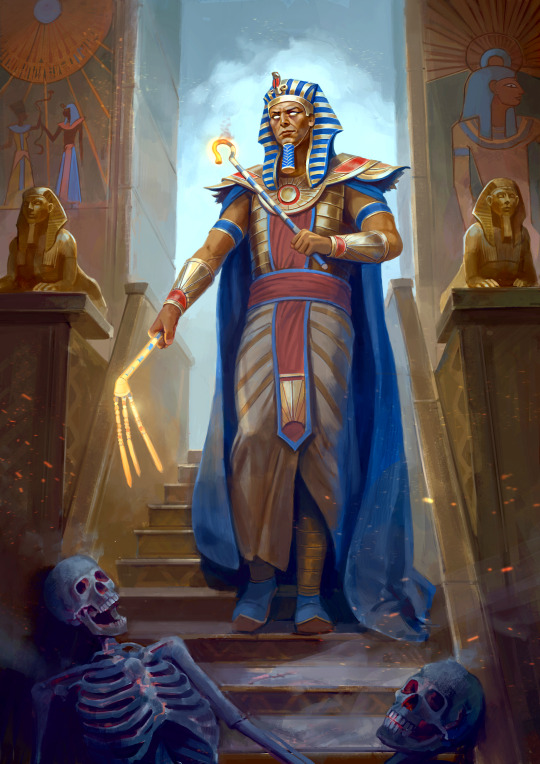
Happy to finally be able to share work for the biggest project I worked for in 2023: Mythic Battles: Isfet by Monolith!
When I was approached me to work on a miniature boardgame set in mythological ancient Egypt the answer was a resounding YES.
I made 13 historical + mythological characters that I am very proud of. I am happy with the feedback I received to bring these to the next level, and also, I had plenty opportunities to suggest elements to add to the design based on my knowledge of ancient history.
AKHENATEN, HERETIC PHARAOH
This is Akhenaten, the infamous pharaoh of the 18th dynasty. He was known for abolishing polytheism and enforcing monotheism to the Egyptian sun deity, Aten. I was heavily inspired by Homelander from The Boys while working on this piece.
#dungeons and dragons#board games#concept art#fantasy art#tabletop games#digital painting#character design#magic the gathering#ancient history#armor#ancient egypt#ancient egyptian#kemet#egyptian art#antiquity#egyptian#akhenaten#nefertiti#archaeology#egypt#amarna period
17 notes
·
View notes
Text
LOVE how kaiba would rather just openly admit to everyone that he has a psychotic disorder than actually believe for a second that ancient Egyptian magic could actually be real
#thinkin bout that one kaiba line#'oh great i'm hallucinating again 🙄'#he's really out here every day like 'yeah NO SHIT there's something wrong with me but there's clearly something wrong w all of u as well'#*experiences vivid flashbacks of his ancient Egyptian life*#'yeah it's just the mental illness don't worry about it it happens 🙄'#'i saw a fucked up melting dragon back in duelist kingdom we don't need to talk about it'#LIKE THAT VERY MUCH WAS THE MENTAL ILLNESS. BUT ALSO MAGIC IS ALSO REAL#LIKE I GET WHERE YOU'RE COMING FROM KAIBA BUT MAGIC IS VERY MUCH REAL IN THIS UNIVERSE
712 notes
·
View notes
Text
Hymn to Hathor, Lady of Gold
O my Lady, come and protect me,
give me abundant life.
Make me healthy on the east side of the sky,
So that I will be established in the horizon.
O my Lady, come and restore me,
O come! Lady of Gold!
Keep me safely on the east side of the sky,
So that I will be protected in the horizon.
O Come, Lady of Gold, O Come!
For millions of years you have sailed
in the Sun Barque of Your Father without ceasing.
As you ride in the boat of your Father, so,
I pray for happiness!
I pray for prosperity!
I pray for health!
I pray for protection!
May they flow from you without ceasing!
Available here and here
I absolutely love this hymn and say it almost everyday
#hathor#kemetic#kemeticism#pagan#pagan witch#witchcraft#egyptian gods#egyptian magic#kemetism#egyptian mythology#ancient egypt
138 notes
·
View notes
Text

Egypt (3rd Intermediate Period, 1069-664 BC), Amulet: cat © Musée du Louvre - Georges Poncet
113 notes
·
View notes
Text
There's writer's block and then there's "hey I know you're almost done with your novel but can you write a bunch of short stories set in a fantasy version of ancient Egypt where random young adults are connected to the Netjeru and basically have elemental powers. Anyway kthxbai.
Also the covers need to be in the style of The Five Ancestors novels but AE"
#misc#writeblr#writers on tumblr#and Set wouldn't be a fucking bad guy#nor would there be evil scary Anubis bois#just guys being dudes in AE with magic#I'm always bitching abt a lack of AE fantasy content so fuck it I'll do it myself lmao#ancient egyptian mythology#ancient egypt
10 notes
·
View notes
Text
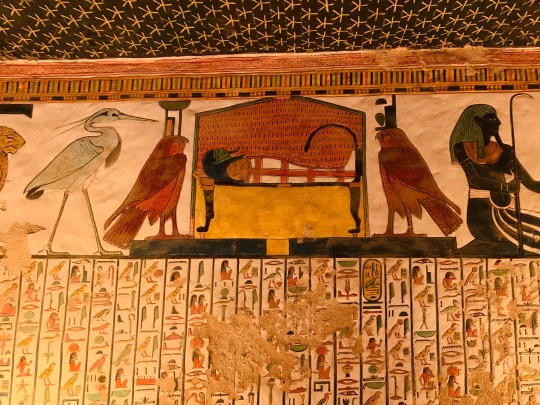
Chapter 17 of the Book of the Dead from the tomb of Nefertari. This chapter focuses on the healing and rebirth of the deceased, drawing parallels with Osiris resurrection, Horus' sight being restored after the loss of his eye, and peace being restored after Sekhmet's rampage. It perfectly demonstrates how Egyptian magic works. By referencing these three elements of myth, where Osiris, Horus and peace and order in the land are all restored, these texts gain the power to effect that same restoration of the deceased. Thus as the deceased is reborn to life in the next world, they are simultaneously healed (like Horus), reborn (like Osiris) and order is restored (as it was after Sekhemet's rampage).
It's really easy to consider the Egyptian myths as simply stories, but that overlooks the dynamic and active part that they play in magic. In many ways, they are a toolkit for the priests. By referencing them and weaving them together, they are able to confer the narratives onto the 'real' world and thereby control events - in this case, the rebirth of Nefertari after her death.
#Nefertari#book of the dead#Egypt#egyptology#Egyptian#ancient egypt#ancient Egyptian#Kemet#Kemetic#Kemeticism#magic#paganism
11 notes
·
View notes
Text
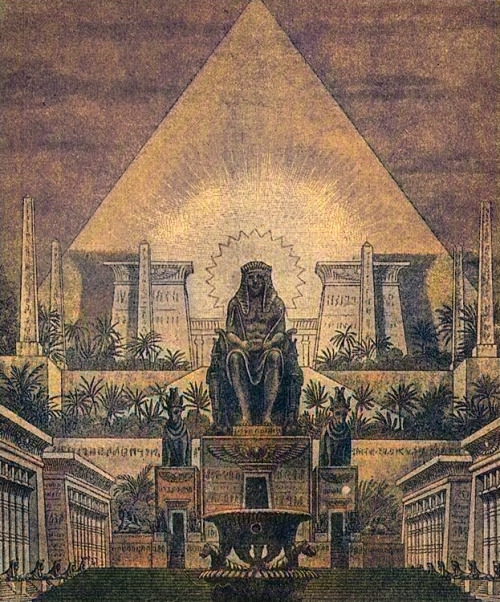
Decoration by Schinkel for the final scene of Mozart's Magic Flute
#karl friedrich schinkel#art#set design#final scene#mozart#the magic flute#opera#history#europe#european#wolfgang amadeus mozart#esoteric#architecture#pyramids#pyramid#freemasonry#egypt#ancient egypt#egyptian#freemasons
165 notes
·
View notes
Text

Happy ArtMonday!
Today I can finally show this artwork ^^
It is a revisited piece, reborn from an original drawing I made 15 years ago
In the heart of Edinburgh lies a haven of secrets, guarded by three sisters, in a world teeming with darkness and mysteries.
In this meticulously artwork, the youngest sister, Rina, stands amidst a labyrinth of knowledge, her sanctuary against the creatures of the night. But she is more than a mere guardian of books—she is a keeper of secrets, a seeker of truth, and a sentinel against the shadows.
Painted with over 170 hours of painstaking detail and imbued with rich symbolism, 'The Lorewarden' is a true labor of love and dedication. Two full days were devoted solely to labeling the 250 intricately detailed books of this extraordinary library. From real tomes to fictional volumes, each book adds depth and intrigue to Rina's quest for knowledge.
Crafted with unwavering determination, this illustration captures the essence of a universe where darkness lurks just beyond the veil of ignorance.
Enter the realm of "The Lorewarden" and join Rina on her quest to uncover the truths hidden within those countless pages. Here, magic, myth, and mystery collide and every word holds a secret waiting to be unveiled.
Are you ready to lose yourself in the exploration of these shelves, discovering which books are fictional and which are not?
Story/Universe is © @valkblue, Character is © both of us.
Software used: Clip Studio Paint.
#isilrinart#my ocs#fanart#redraw#books#knowledge is power#antiquity#greek mythology#norse mythology#egyptian mythology#mysticism#norse gods#egyptian gods#red-figure pottery#Ancient Greek painted pottery style#vegvisir#magic#redhead beauty#LKL#RinaLKL
7 notes
·
View notes
Text
Reincarnation...Oneness...Know Thyself...
I am Yesterday, Today, and Tomorrow, and I have the power to be born a second time; I am the divine hidden Soul who createth the gods…Hail, lord of the shrine which standeth in the middle of the Earth. He is I, and I am he… ~ Egyptian Book of the Dead (Chapter LXIV, Papyrus of Nebseni…Chapter of Coming Forth by Day in the…
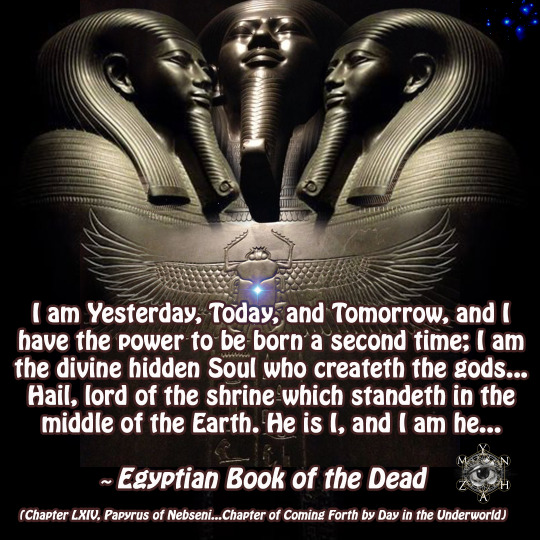
View On WordPress
#Afterlife (Quotes)#Ancient Egypt#Ancient Egyptian Proverbs#Chance Gardner of Magical Egypt#Death (Quotes)#Egyptian Book of the Dead (Quote)#God#God (Quote)#God Head (Quotes)#Godseeds (Quote)#Know Thyself (Quotes)#Knowledge (Quotes)#Kundalini#Kundalini (Quotes)#Life Quotes#Near Death Experience (Quotes)#Out of Body Experience (Quote)#Reality (Quotes)#Reincarnation#Reincarnation (Quotes)#Remember Thyself (Quotes)#Remembrance (Quotes)#Self-Realization#Self-Realization (Quotes)#Soul (Quotes)#Spirit (Quotes)#the Self#The Wisdom of the Egyptians#Third Eye#Third Eye (Quotes)
8 notes
·
View notes
Text
Egyptologists digging in Abusir, have discovered the tomb of a previously unknown scribe. Not only was this burial decorated with gods and goddesses, but it was enchanted with magic spells associated with snake bites.
50 notes
·
View notes
Text
I'd like to share some fascinating insights about the ancient Egyptian concept of Heka, which refers both to basically the concept of "magic" in Egyptian terms and to the deity who personified that concept, derived from The Mechanics of Ancient Egyptian Magical Practice by Robert Kriech Ritner. I do not doubt it will have a certain relevance to the broad milieu of Left Hand Path occultism, though in a larger sense I figure it has important things to say about magic in paganism. What follows is an overview of how Ritner covers the concept of heka.
Heka is an Egyptian word that was selected by Coptic scribes to translate the Greek terms "mageia", and therefore magic. Magic is often defined in opposition to traditional religion, and this understanding was sadly, to varying degrees, reflected in pre-Christian Roman and Greek cultures almost as much as it was across Christianity (remember, the Greek word "mageia" was typically derogatory), but this was just not the case for ancient Egyptians. In fact, if by magic we mean heka and by heka we mean magic, magic was seen by ancient Egyptians as an important part of religious life and the life of the cosmos itself. Egyptian texts such as the Pyramid Texts treated magic or heka as something that someone could possess and work over the cosmos or the world around them. That being said, understanding what heka means also depends on understanding the god Heka.
Heka is a deity who is first attested to in visual form at the funerary temple of the Fifth Dynasty pharaoh Sahure, where Heka is depicted leading a procession of gods bearing offerings to the pharoah. In the Coffin Texts, there is a spell meant to allow a magician to become Heka, which also serves as the longest theological exposition on the concept of heka or magic. In this text, the god Heka is shown as the first being to have been created by Re-Atum, who was created before the emanation of Hu (the first word) and before the emergence of duality, gave rise to the Ennead, and thus preceded almost all of the other Egyptian deities. In this sense, however, Ritner argues that the god Heka is really a hypostasis of the creative power of Re-Atum which is the source of the order of the cosmos itself. Further, in the Coffin Texts, Heka is also said to inspire fear in all the gods who came into being after him through his powers, and came into being of himself. Heka's creative power is not limited to a single event but is instead re-enacted daily. In fact, Heka is depicted as taking his place on the solar barque of Ra as a protector of Ra.
Heka, as magic, was understood as a power that could be used defensively, both by the gods and by humans, to destroy their enemies or preserve existence. In fact, according to the Instructions for King Merikare, magic was divinely created as a "weapon" for human beings to use for their own defense. Heka was thus, on its own, perfectly religiously legitimate, not to mention perfectly legal, but in a sense it was also basically "morally" neutral. It could be used to defend or create things, but it could also be used for "evil", presumably usually meaning hostile or "criminal" acts. "Sorcery" in itself was not illegal in ancient Egypt, but it was illegal to use magic against the king. In that context, though, one might assume that the crime was not magic itself but rather was understood simply as a form of sedition or seditious conspiracy. In fact, there is only one trial in the whole of Egyptian history for sorcery: the crime was using wax figures for magic in a plot against the throne, and even so the magic itself came from books that belonged to the king himself. Otherwise, the Coffin Texts also apparently mention an "evil magic", a form of heka used by spirits of the underworld and sorcerers that the deceased does not obey, but this is in the sense of meaning "hostile" magic - as in "hostile" from the perspective of deceased souls, and Ritner stresses this is nothing like the concept of "black magic" taken for granted in our Western Christocentric culture. Even Apep, who is daily destroyed by Heka, has his own heka and spells that he wields ineffectually against Ra.
Even so, Heka has an interestingly ambiguous stature, even in relationship to the cosmic order. On the one hand, the god Heka is depicted as the generator and protector of cosmic order. On the other hand, heka is something that can be used to threaten other gods and the order of the cosmos. In the Book of the Heavenly Cow, Ra flees into the heavens from magicians who act as they please using the magic that is in their bodies. In Egyptian myth, Ra refuses to share his divine name with Isis on the grounds that he doesnt want magicians knowing it and therefore being able to threaten him with it. Egyptian theologians sometimes responded to this idea by declaring that at least some gods (for example, Shu and the divine bull of Medamud) were immune to the effects of magic. Despite this, there are numerous magical texts and spells in which magic had the power to threaten gods, the solar barque, and even the existence of the cosmos. According to Ritner, this reflects a widely held Egyptian belief in the power of heka as something all beings are subject to. You can see this clearly in the Greek Magical Papyri, in which lots and lots of spells featured compulsion rites or "threats" made to various gods by magicians, often assimilating into the identity of other gods.
Incidentally, the god Heka was also sometimes seen as having the power to threaten the souls of the deceased: in the Book of Coming Forth by Day (or "The Book of the Dead"), Heka can be threatening to the deceased soul along with a thousand violent divine guardians who stand beside him, and this threat has to be overcome by the deceased (though, again, this isn't necessarily supposed to mean something demonic).
Interestingly, the Egyptians did not see heka as something "supernatural" in the sense that we think of it today, and neither was it seen as "prenatural" as such, but rather as something present within "nature", or at least within the order of the cosmos itself, and as something that gives life to the cosmos itself. It was thought to reside in the bodies of gods and humans as well as in the plants and stones of the earth. This is actually very much in line with the concept of sunthemata as presented by "Neoplatonist" philosophers such as Iamblichus and Proclus, in which The One and/or the divine is diffused across all things in the cosmos, even plants and stones. In the Book of the Heavenly Cow, Ra is also depicted as being immanent in heka or Heka, which in turn is imminent in everything else. This is very interesting because it's as if Ra sees himself as being threatened by that which he himself is immanent in. Even more interesting is the text's ba-theology, in which heka is established as the ba-spirit of Ra himself, who created and established the heavens to house the ba-spirits of the other gods in. So heka is the ba-spirit of Ra, who is immanent in heka, which in turn is immanent in the bodies of the magicians who now threaten Ra. On the other hand, a separate hymn currently housed in Berlin depicts heka or magic as the ba-spirit of the god Ptah. In later papyri, heka is describe as the ka of Ra.
Ritner suggests that Heka's association with ka is linked to the power of heka to enter or penetrate the ka of anything in creation and invest it with either generative or destructive power. Power itself becomes the emblem of Heka's name. In Ptolemaic hieroglyphs, the image of Heka featured a phty-sign on his head, which Ritner suggests is a way of writing the word "ntr", or neteru, meaning "god" or "deity", thus reflecting the notion of the gods as being sources of heka or magical power. In another payprus, Re-Atum says "magic (heka) is my name".
Heka (magic) is to be understood as a power immanent throughout the cosmos, which both underwrites the very existence of the cosmos and might potentially destroy it, and can both support the order of the cosmos and subvert and shatter it; divine power that also threatens gods. That last part is in the sense that heka (magic) comes from the gods, is immanent in gods and at least one god is immanent in it, but it is also capable of threatening gods and spirits, or allowing magicians to do so. The way that works runs along lines similar to the theurgical logic of sunthemata, but also runs along the lines of Egyptian theology concerning ka. From that very standpoint, you can see the true extent to which the magic of the PGM is underwritten by Egyptian theology.
Those who align with a "Left Hand Path" magical orientation can clearly derive something useful from this conception, especially when seeking a link to paganism that might break them from what they see as the confines of the Christocentric religious imaginary. It seems then that those who want a pagan magical worldview that also allows the same kind of Promethean conceit so present in modern Satanism and similar systems would do well to explore the subject of ancient Egyptian magic and theology.
7 notes
·
View notes
Text
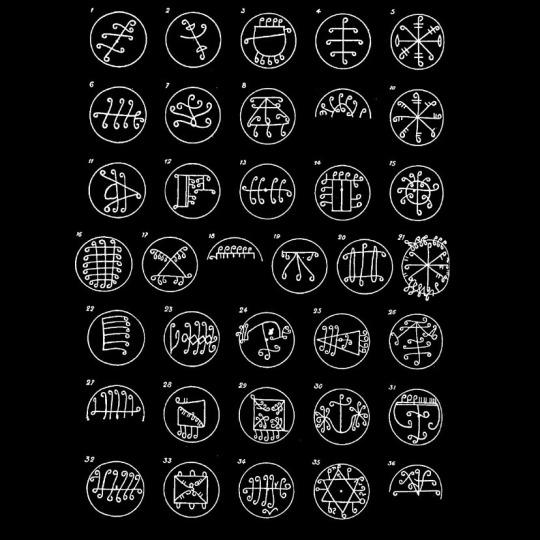
Sigils of the 36 Decans from the Catalogus Codicum Astrologorum Graecorum, a compilation of translations of Greco-Egyptian magical texts on the Decans and their uses.
The names of the Decans as given in the catalogue:
𓇼PARKHÁM
𓇼OUALÁKH
𓇼DELPHAÁ
𓇼ZAKKHÁL
𓇼KHOUNTHÁ
𓇼ANESIOÚM
𓇼PARESKHÁRTI
𓇼HIERASESÊR
𓇼ANASÁM-TETÊKH
𓇼SARKHAÁM-KOMPHES
𓇼TENOÚM-TANLÁKH
𓇼TROUKHÁP-IÁLEM, SAMPÁKH
𓇼APHÁKH-MPEÍTH, PANKHATÁP
𓇼TALANTÍS-KHARKHÁM
𓇼DEROPOÚT
𓇼MENAÍM-KHILLÁ
𓇼MPEÍ-PHOLÁKH
𓇼MARKHEM
𓇼ZÁKH-MEM
𓇼SEPTETÚL
𓇼SELOUÁKHAM
𓇼AMPÁNAN TZÉNGGIKH
𓇼LÁPH-MEÍKH
𓇼ARKHÍMOI-IELOÚPH
𓇼ANASÁM-TERIKHEM
𓇼MAKHRÁM
𓇼KHALKHÊM-IKHÉM
[Capricorn is missing]
𓇼BAZEÍNKH
𓇼KHOUNLIÁKHM
𓇼MAKHILOÚKH
𓇼KAÍN-KHÁM
𓇼POKH-MELLEPH
𓇼SUREM-OLÁKHM
#hermetismo#hermeticism#hermetic philosophy#hermetic library#hermetica#Egyptian decans#decans#decan spirits#star spirits#astrology#astrological magic#hellenistic astrology#ancient astrology#astrology witch#astrologycommunity#traditonal astrology#magicien#amulets#talismans#talismanic#sigil witch#sigil magic#sigil making#sigilcore#sigilwork#sigils#sigilyph#sigil creator#egyptian astrology
51 notes
·
View notes
Text
Anyway, since I’m here translating random stuff that I like, here’s “the blood is the life!” in Middle Egyptian:
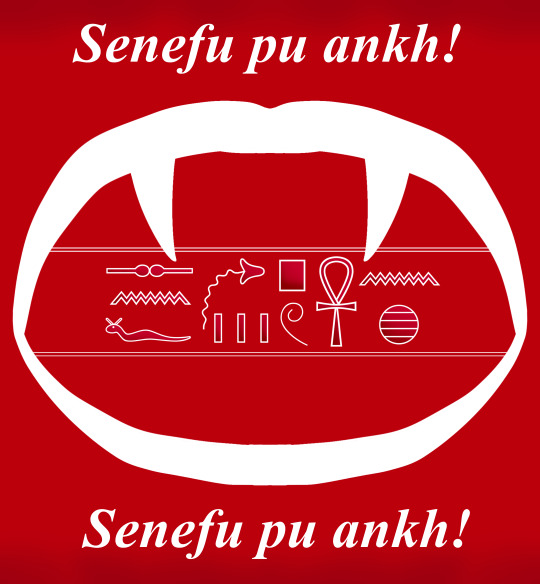
Snfw pw ʿnḫ!
I decided while making this that I really like the idea of Renfield being casually familiar with a bunch of ancient/long dead languages? Like, I don’t think he’d actually be able to speak Middle Egyptian or anything like it, but I think he’d be able to recognize the hieroglyphs and maybe a few specific words or symbols or pieces of iconography. Maybe he’d use the glyphs as part of some sort of cipher, and that’s part of why Seward has a hard time understanding his diary when he steals it from him.
#Dracula#renfield#rm renfield#dracula daily#<- oof thought I’d never use that tag again#R.m. renfield#Id in alt#ancient egypt stuff#ava has thoughts#Since I’ve been reading a bunch of magical texts and stuff recently I’ll say I also really like the idea of him kinda knowing about those#But I don’t know realistic that would be considering publication dates and whatever#Also I don’t think he’d be that interested in what’s in most Ancient Egyptian magical texts#*Except* maybe the Greek Magical Papyri#Specifically I really like the idea of Renfield knowing about that one spell in the PGM that’s about—#—getting Set-Typhon to bully everyone else in the universe into doing what you want. I think he’d really like that one#Also if he knew magical texts then when Seward is doing his asshole doctor thing Renfield could cryptically quote them#And then fall silent and refuse to answer whenever Seward asked what he meant#And think smug thoughts about how his abuser is a stupid little baby twink man who doesn’t know what a Set-Typhon is#And that sounds fun for him‚ I think he should get to do that
18 notes
·
View notes
Text
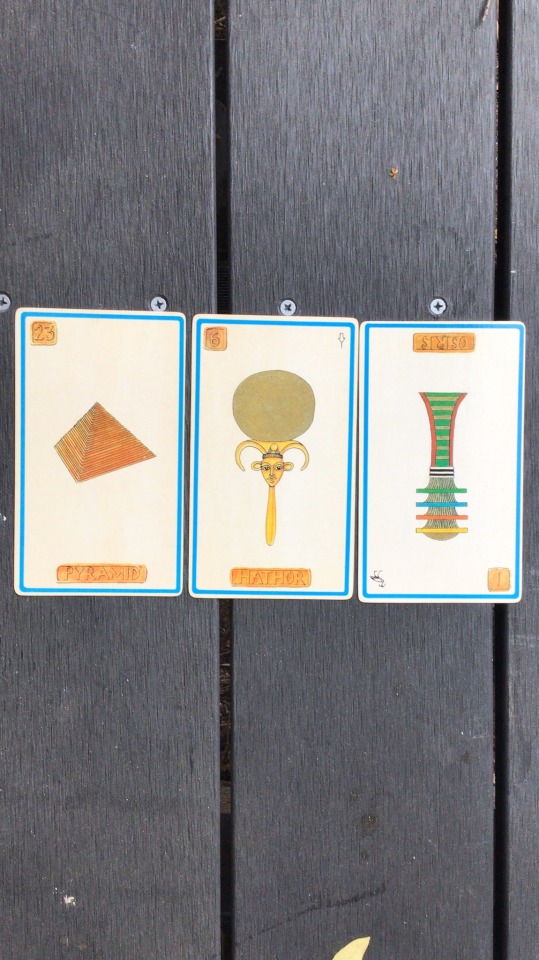
A fundamental shift in your thinking has happened almost instantaneously on how you approach and deal with a problematic issue affecting you today. Your confidence in not falling back into your old patterns and customs seems well and truly buried as you instigate this new action plan into action. Just be aware that it may not instantly achieve reliable results you think will happen because of this.
#Oracle of Ancient Egyptian Magic#The Way of Cartouche#oracle card reader#oracle card reading#oracle deck#oracle cards#divination#fortune telling#fortune teller#message for the collective#gay pagan#oracle reading#oracle reader
13 notes
·
View notes